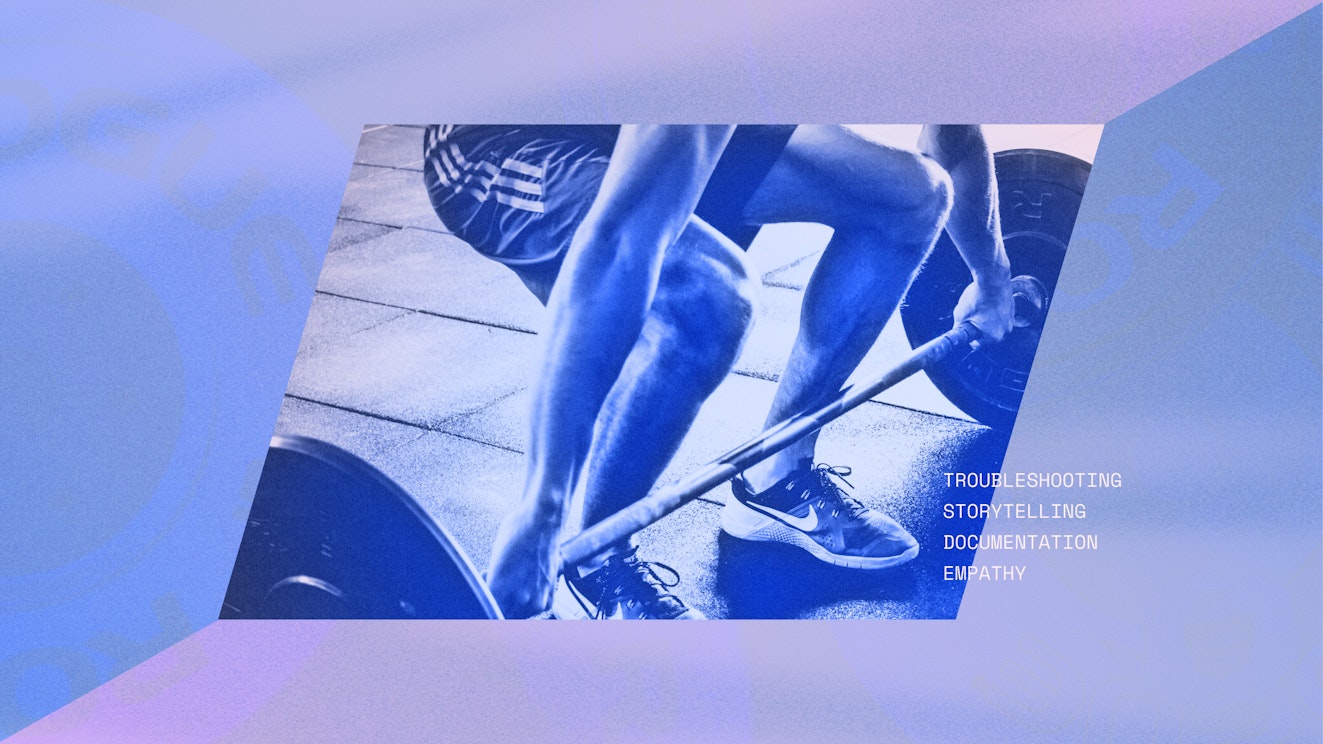My current obsession is a Korean reality competition show called "Physical: 100." In this series, Netflix gathers 100 of the best athletes in South Korea to compete against each other in a variety of challenges to find the ideal physique. The cast includes bodybuilders, an ice climber, UFC fighters, and a pilates instructor, just to name a few.
In one challenge, there might be an Olympic gymnast battling a bodybuilder in a test of grip strength by hanging from a high bar. In another challenge, we see head-to-head matchups testing agility and speed as a professional dancer plays keep away with a rugby player. In yet another challenge, a test of brute strength is on display as we see groups of athletes working as a team to move a two-ton ship.
As I’ve watched the show, I’ve been reminded of what I see in the support queue every day: people with diverse skills tackling wide-ranging challenges. Although I have yet to personally field a question in the queue about how to move a two-ton ship, our team is handling all kinds of tough challenges.
The participants in “Physical: 100” have spent their careers developing skills like speed, endurance, brute strength, balance, flexibility, and explosiveness. I couldn’t help but draw a connection between these physical feats and the kind of brain muscles I’m training in my own support career.
As we venture into this next season of support, where AI will make our landscape more competitive and providing human support will become more demanding, what kinds of skills should we be developing?
Let’s talk about those skills, why they’re important, and how to develop them.
Troubleshooting mindset
Technical support involves a whole lot of searching. In practice, this can mean trying to reproduce an edge case bug in five different browsers, 40 minutes of digging through API logs, or reading a month's worth of previous conversations to understand the full context of a problem (which you can use AI Summarize to help with, by the way!)
Working in a support queue can sometimes feel like finding a needle in a haystack. The nature of this work calls for someone who isn’t discouraged easily and is excited to jump into that haystack!
Folks with this strength have a high tolerance for setbacks and are able to break down complex issues. If you feel like this skill isn't one of your strengths currently, we’ve got a great resource that dives into the art of troubleshooting on the blog.
Proactive thinking
In the (not so far off) future, AI will answer many of your customers’ immediate questions about how your product works. But what about the questions customers aren’t asking that they should be asking? That’s where you’ll need proactive support skills.
For example, let’s say a customer writes in asking if they can add another inbox. Our Plus Plan includes five inboxes, but this customer is asking for a sixth to be included. It would be accurate to say, “Sorry, we aren’t able to add a free inbox to your plan; additional inboxes are available for an additional $10/month per inbox.”
While technically correct, it wouldn't be very helpful to give that answer and stop there. A more helpful and proactive approach would be to explain that inboxes are definitely available, albeit at an additional charge, and also educate the customer about other features that can remove the need to add additional inboxes in the first place. In our case, they can use features like Teams and alias features that allow folks to support multiple products or brands all from the same inbox.
When people reach out to support, they might not know exactly what they’re looking for or what solution will be most helpful to them. Proactive thinkers can see a hyper-specific question and read between the lines to parse out the customer’s ultimate goal.
Head to the blog to learn more about how you can solve for outcomes and think proactively.
Empathy
Real empathy calls for high emotional intelligence, and while it’s sometimes called a “soft” skill (or more accurately, a character skill), communicating with empathy impacts your customers and the business in so many meaningful ways.
The ability to feel empathy for the customer on the other side of our support queues is how support teams build rapport, enhance customer satisfaction, build brand loyalty, and increase customer retention.
While this skill is tough to teach, reminding your team just how powerful true empathy can be is a step in the right direction. A great lesson in empathy is this story of how The Red Cross leveraged empathy in its mission to motivate folks to donate blood.
Storytelling
Support pros are spending time reporting bugs and tracking customer feedback, yes; but a large part of this job is really about being an effective storyteller.
A great support professional is able to tell the story of your product or service in a way that each customer can understand. In practice, this can look like simply matching the structure of a customer’s question. If the customer structures their questions in bullets, you might structure your answers the same way; if a customer sends in a screen recording explaining their problem, take the time to create a short video to send back to them.
This might seem like a small touch, but if support pros can’t create a compelling story about how to gain value from your product, it will be difficult to educate customers and help them to successfully use your product.
Even outside of the queue, your support team is the voice of your customers within your company as well! Support pros need to be able to take the customer knowledge they’ve gained in the queue and translate that information in a way that keeps your product, marketing, and leadership teams informed and on the same page about customer needs.
Learning the fundamentals of storytelling can help you connect and nurture relationships with your customers and internal stakeholders alike.
Documentation
Serving customers requires a massive amount of product knowledge — and it’s impossible to hold all of that in your brain at once. That’s why having clear and detailed documentation, for both customer-facing and internal uses, is vital to support teams. This is especially true in the new age of AI support, when the quality of your documentation will determine the quality of your AI outputs.
Writing good documentation requires the ability to break down complex concepts into smaller, easy-to-understand parts and structure content in a way that makes sense for your customers as well as your support team. Folks with this skill love immersing themselves in all the details and know exactly which details others need to know.
Beef up your writing skills with this handy guide, and learn how to build systems to prioritize technical writing on your own support team.
Support is a team sport
“Physical: 100” is a competition — but as I watched the show, it also felt like a celebration of many different physicalities and strengths. I think support teams should feel like that, too. All of the skills we talked about here are incredibly valuable on a support team, and no one skill is more important than another.
For individual contributors, which of these skills feel like strengths for you? Which are areas where you might have more room to grow? Knowing your strengths can help point you toward a specific support career path or help you figure out how to continue growing within your current position.
For support leaders, understanding these skills is a valuable tool as you work to build a balanced support staff. Recognizing employee strengths is key for mentorship, aiding in career development, and connecting the dots between one person’s work and their business impact. It’s also great to find ways to celebrate what each person brings to the table beyond typical dashboard metrics.
And remember, it’s unrealistic to expect that any support pro should be the best at all of these skills, the same way that it's unreasonable to expect a bodybuilder to have the same flexibility as a ballet dancer. For support pros and teams, the goal should be a healthy balance of these skills and a celebration of team strength.






